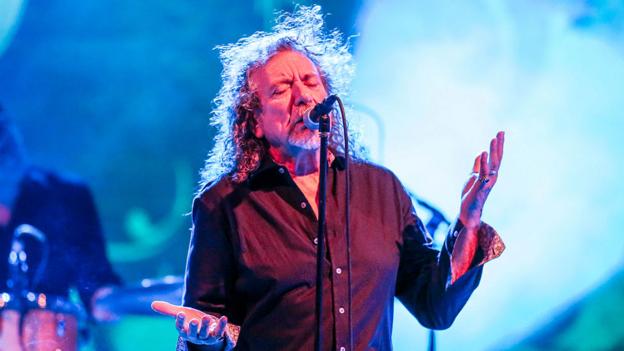
(Photo: Rex Features)
Reunions are big business. But one ‘70s superstar – Led Zeppelin’s Robert Plant – is bucking the trend. Greg Kot explains why.
It’s just a wild guess, but the Rolling Stones’ recent run of paydays, er, concerts, are not likely to have gone unnoticed by the former members of Led Zeppelin. The Stones have been away for a while, are all around 70 years old, and are playing songs from three and four decades ago on their current tour. But with tickets going for as high as $600, they’re pulling in millions of dollars in revenue each night.
Somewhere, Jimmy Page and John Paul Jones are thinking: “This too could be ours.” A 2007 Led Zeppelin reunion concert at the O2 Arena in London with original members Page, Jones and Robert Plant, joined on drums by Jason Bonham (the son of the late John Bonham), was a success artistically and commercially. The show set a record for ticket demand, with 20 million fans wanting in, according to the Guinness Book of World Records.
But the reunion proved to be a one-off, largely because Plant wanted no part of doing something more, despite tour offers ranging as high as $200m (£132m) from concert promoters. Page and Jones even started working with other vocalists in Plant’s stead in hope of keeping Zeppelin afloat, but never took it beyond the rehearsal stage. Plant instead focused on touring in 2008 with country singer Alison Krauss and producer T Bone Burnett, with whom he made a Grammy-winning album, Raising Sand. It didn’t sound anything like Led Zeppelin – a guiding feature behind most of Plant’s music in the three decades since Zeppelin imploded after John Bonham’s death in 1980.
Once more with feeling
It’s the era of reunions, with everyone from classic-rockers to the first generation of Lollapalooza bands pulling together one more time for the big bucks, but Plant is no bandwagon jumper, despite the eye-popping revenue potential. Consider that the Police raked in more than $340m(£225m) on a 2007-08 comeback tour, the Eagles collected $250m (£165m) in 2008-11, and the Pixies have played to audiences five to ten times bigger in the last decade than when they were releasing ground-breaking albums in the late ‘80s and early ‘90s. This year, it’s The Replacements’ turn – or what’s left of them. Paul Westerberg and Tommy Stinson have signed up to play three dates at Riot Fest in Toronto, Denver and Chicago, after rejecting lucrative offers from festivals such as Coachella and Lollapalooza for years.
The exceptions to the trend are dwindling. So far, the Smiths have resisted a big-bucks rapprochement, with Morrissey steadfast in his contention that it will never happen. Ditto for a victory lap from indie-rock favorites Hüsker Dü, with Bob Mould in no mood to commingle assets with Grant Hart. But Plant is the most notable hold-out of all.
The singer has his reasons, which he has rephrased countless times over the decades, turning many of his responses into punch lines: “It would be like sleeping with your ex-wife again without having sex.” Engage Plant more deeply on the subject of what it means to play music, and he’ll tell you it’s all about discovery, new challenges. He sees a Zeppelin reunion as a nostalgia piece “fired by youth and a different kind of exuberance,” as he once said.
Part of his response suggests that it would be difficult to do anything Zep-related on his terms; that is, to create and perform new music rather than rely on rehashing the past. Even if Plant, Page and Jones reunited to make a new album, would fans want to hear them play it in concert at the expense of Whole Lotta Love and Stairway to Heaven? And if the band was somehow persuaded to crank up the ‘70s jukebox, could Plant hit those high notes and conjure the bravado of the bare-chested “golden god”?
Reinventing the past
Plant certainly has his doubts. Call it integrity, common sense or just plain old distaste for reliving the past, the singer is that rare ‘70s superstar whose second act is as artistically rewarding – if not as financially lucrative – as his first. Even when he performs Zeppelin songs these days in concert, it’s with a twist, taking the music back not only to its roots in Mississippi Delta blues, but to the shores of West Africa. At a recent show in Grant Park on Chicago’s lakefront, Plant and his genre-bending band, the Sensational Space Shifters, refashioned Whole Lotta Love around a droning, one-string African fiddle rather than an electric guitar. A trance-inducing mix of keyboards and stringed instruments supplanted the flying metal shards of another Zep warhorse, Black Dog. Plant wasn’t trying to shout so much as snake through the songs, darting and diving between the syncopated beats and finding melody lines inside the band’s shadowy interplay.
With his greying hair tied up in a Miami Vice-style bun, he looked like he was having a blast, shimmying as the Space Shifters reshaped time. His fans – who have been trained to expect the unexpected from him – danced. The 64-year-old singer smiled devilishly and thanked the audience for indulging him “an evening of soft rock.” He poked fun at the days when he wrote lyrics filled with “mad hobbits and Vikings“.
How much did Plant get paid to have all that fun? According to city records, $125,000 (£82,400)– a tenth of what he might have hauled in had he been performing with Jimmy Page and John Paul Jones. Sure, Plant doesn’t need the money. But it appears he needs Led Zeppelin even less.
No comments:
Post a Comment